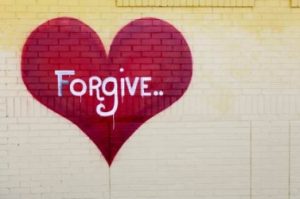In my business it’s pretty common to hear “I forgave her but I’m never going to forget,” or, “I’m a [insert religion of choice] and so I HAVE to forgive him/her.” My favorite, “Forgive your brother right now!” is one I heard a lot growing up.
When an offense occurs in a relationship the ‘Receiver’ (the one who was offended or impacted by the thing) will probably expect an apology from the ‘Actor’ (the one who did the thing). If the ‘Actor’ has read my blog on what makes a good apology, then he will know how to be more than just an apologizer. He will be a Rebuilder/Amends-Maker. A Rebuilder not only apologizes, he makes a conscious, visible effort to change. If he has not read my blog, then he may resort to justifying his actions, blaming situations outside of himself, blaming the Receiver, or minimizing the impact of his actions by saying things like, “I’ve been getting a lot better at quitting this behavior,” or, “I only hit you once this time!” or “If we had sex more often I wouldn’t cheat!”
This blog is about forgiveness. Forgiving the apologizer who tries to be a Rebuilder or Amends-Maker. Forgiving an Actor who justifies, minimizes, blames the receiver, or never apologizes in the first place. Yes, this blog is about how to forgive anyone easily. Because here’s the thing: Forgiveness isn’t a process or an event.
It is an AWAKENING.
When you get stung by a bee, you get angry and hurt and you may even kill the bee. In retrospect, you may say to yourself something like, “I hope I never get stung again,” and “well that’s what bees do.” From that day forward you may run away from bees, swat bees, or spray bees with insecticide (please don’t do that, bees are endangered), but you will never say “I wonder if I should keep that bee as a pet,” or “I think I’ll start a beehive in the middle of my kitchen.” Why? Because you learned that a bee sting hurts and distance from a bee keeps you both safe, comfortable, and alive.
This is acceptance. This is forgiveness.
Forgiveness/AWAKENING begins by recognizing the nature of the person who offended you, then choosing to draw near or create distance, and validating the feelings that follow.
Recognize
Maya Angelou said, “When someone shows you who they are, believe them the first time.” Too many of us don’t believe our friends, family, and lovers when they show us who they are the first time. When they cheat on the relationship, assault us physically and emotionally, betray us again and again, we choose to believe our own rose-colored glasses that tell us who we wish they would be. We feel anger rise up in us and we attack or retreat in the battle with the offender, but we refuse to let ourselves see them for who they are trying so desperately to show us they are.
So we go back. And we fight. And we run away. And we come back.
Recognizing the humanity in the offender is one of the deepest forms of love and respect we can offer. Recognizing that the offender will only change when he/she is ready and ending the battle to change him or her is life-changing. Letting go of ‘what could be’ and ‘what I want’ and surrendering to the free-fall of what is, can be terrifying. But it is in that moment of surrender, that we can choose.
Draw near or create distance
We can choose to draw near the offender. We can ask them to come to counseling. We can offer resources like rehab or residential treatment. We can let them know we are in this with them as long as there is positive movement toward relationship goals.
Or we can choose to distance from the offender. We can realize that we have been stung too many times. We can decide our health and comfort and safety are important too and seek to save ourselves. And finally, we can decide to let our offender remain who they choose to be without interference from us.
Validate the feelings that follow
If our offender chooses to unite with us and work on the relationship with a third party and become a rebuilder then we will validate our feelings of joy because we may yet get to experience intimacy. We will validate feelings of anger because after all, why didn’t they change before now? We will validate feelings of fear because what if they go back to their old ways? And finally, we will validate feelings of anxiousness as we watch our offender become someone who is open and healed, someone we’ve never met before.
If our offender chooses to sting again, then we will validate our grief. Shock, anger, denial, bargaining, depression, and finally, acceptance, will all need their turn in our consciousness. If we try to run back and put the beehive back in our kitchen, then our reliable offender will be sure to sting again and again. They will do this to remind us they are not a chunk of clay to be molded into the next comfort object; that they are who they are and they will change on their terms. So eventually, as our AWAKENING progresses, we will move through the stages of grief and understand that our offender has been trying to show us who they are for a long, long time.
Forgiveness is the moment when we AWAKEN to who our offender is and not who we wish they would be. When we save ourselves and allow the grief free reign over our consciousness and our decisions.
The bee, after all, is not bad. She is only a bee.






